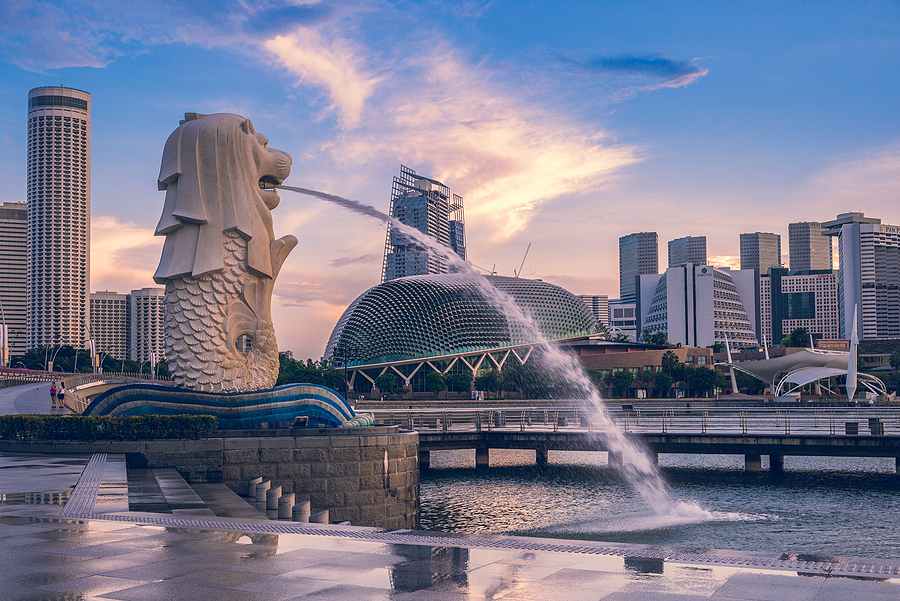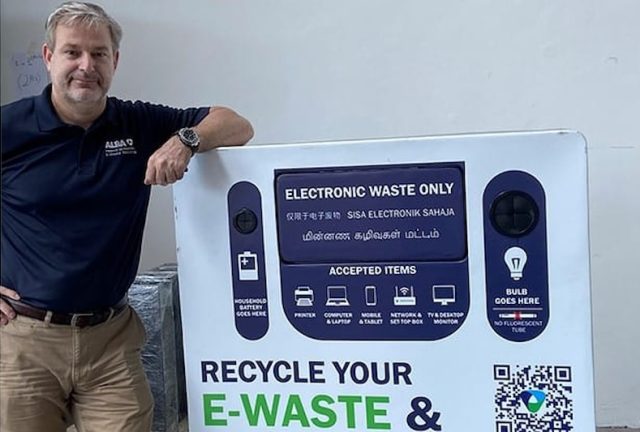
Singapore Partners With Alba
In a recent announcement, Singapore’s National Environment Agency (NEA) has chosen Alba Group plc & Co. KG, based in Berlin, to manage a producer responsibility system for obsolete electronics across the country.
Since 2018, Alba has been a part of a joint venture in Hong Kong that has successfully implemented a similar automated e-scrap dismantling and processing facility.
Alba to Implement E-Waste Collection Facility
General Manager, Fons Krist, of Alba E-Waste Smart Recycling, has been instrumental in supporting the company’s ambitious plan to assist Singapore with its initiative to gather and recycle up to 20 different types of end-of-life electronics.

At this beginning of this year, Alba, a subsidiary of the Berlin-based company, received a contract from Singapore’s National Environment Agency (NEA). This extended producer responsibility (EPR) program required the organization to create a collection and diversion system to be in place by July 1st.
As a result of this timeline, Alba has taken up leasing rights on an area of 3,910 square meters (42,000 square feet) located in Singapore’s western region. In addition to this, they have also introduced a fleet of delivery trucks, and 500 collection bins across the entire nation.
Dr. Axel Schweitzer, board chair of the Alba Group, comments “We are honored to support Singapore on its journey to become a leading location for sustainability. We will continue to work with all our partners to bring Singapore a step closer to its goal of becoming a Zero Waste Nation. To achieve this, we are linking our advanced waste management and recycling technology with digital offerings.”
COVID’s Impact on Collection
Though collection events had been halted due to the COVID-19 crisis and other business operations slowed, Krist explains that Alba is taking the appropriate steps to comply with its five-year contract for disposing of the nation’s unwanted electronics. Some of these items include: old refrigerators, air conditioners, TVs, computers, mobile phones, batteries, light bulbs, and other items mandated by the NEA.
The NEA adds, “To develop Singapore’s EPR scheme for e-waste management, NEA studied similar EPR schemes implemented in countries and jurisdictions such as the EU, Japan, South Korea, Australia, Taiwan and Hong Kong.”
Public Acceptance
Results from Alba’s first few months of collection indicate that some of NEA’s diversion targets may be difficult to attain. Despite this, Krist claims “a good reception from Singapore residents” regarding the system, which is funded by fees paid by manufacturers of covered electronics and appliances. To ensure its success, continuous publicity and outreach will remain a key element for Alba.
According to Krist, the collection of air conditioners and electric vehicle batteries is currently ahead of schedule, and he believes that refrigerators and other large appliances will be just as successful. On the other hand, it remains uncertain whether or not individuals and small business owners can be persuaded to bring batteries, bulbs, and mobile phones to the designated recycling points.
Alba Aids EPR Program
Singapore’s NEA states, “Alba, formed in 1968, has a demonstrated track record in operating producer responsibility schemes in countries such as Germany and Hong Kong. Alba also has a local presence and is familiar with the local waste landscape and e-waste recycling industry, having been appointed the Public Waste Collector for the Jurong Sector since April 1, 2020.”
Each year, the Government of Singapore assigns weight goals to more than 15 covered commodities that Alba must collect or process. These include electronics ranging from large refrigerators to small light bulbs, all of which are tracked and weighed upon arrival to the warehouse.
At the warehouse, minimal processing is done; instead, Alba distributes the items to accredited recyclers. To guarantee that all electronics are being taken apart and recycled according to EPR system regulations, audits of these businesses are held regularly.
At Alba E-Waste Smart Recycling, it is up to the employees to ensure that unwanted items are removed from collection bins. On a recent day, Krist motioned towards three items that had been wrongly collected: a power drill, video game controller, and barbecue grill part. Each of these objects must be separated from the rest, in order to ensure that only acceptable products are put forward for recycling.
Streamlining productivity at the warehouse requires placing laptop computers, power cords, mobile phones, and other related items into bulk bags and diverse containers. These items then move on to be recycled by a network of companies in Singapore.
Alba Offers Complete Openness
For Krist, complete transparency is key to the program’s success. This includes granting local reporters access to the warehouse and financial records, with nothing being off limits. “There should be nothing I have to hide,” Krist insists.
Though the collection figures have yet to meet Singapore’s NEA goals, Krist remains confident that increased retail activity and post-pandemic collection events will support more substantial progress. He remarks, “It is early in the program, and we have not had ideal conditions, I’m looking forward to the strides we can make as this program really gets going.”
NEA deputy CEO, Ram Bhaskar adds, “Recycling e-waste protects human and environmental health and helps to conserve our earth’s precious natural resources. This is the first EPR scheme to be introduced in Singapore, which is an important step to close the e-waste loop and adopt a circular approach toward resource management, as envisioned in Singapore’s Zero Waste Masterplan.”
With Alba on board, combined with the company’s previous successes in Hong Kong, Singapore’s NEA is confident that this program will continue to gain forward momentum by building on small successes.
